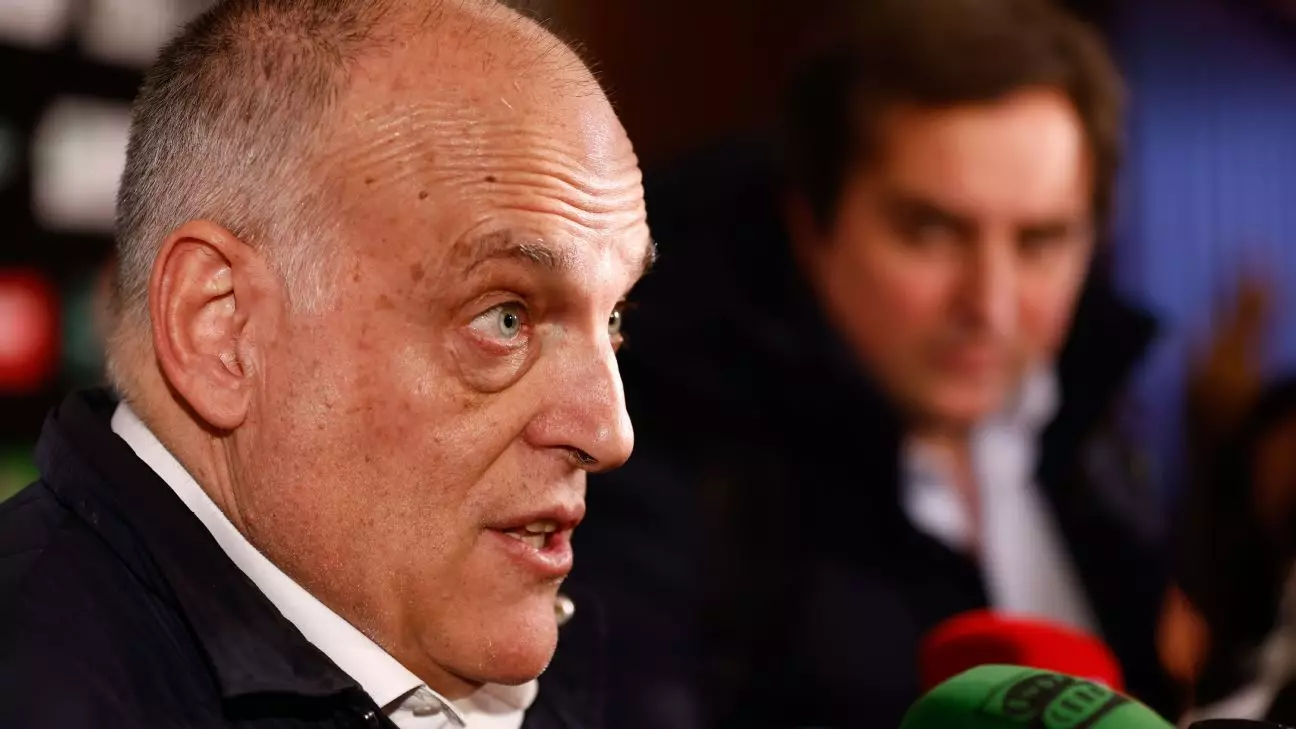The landscape of Spanish football has always been marked by intense rivalries and heated debates, yet recent statements from LaLiga president Javier Tebas have intensified the ongoing friction between his organization and one of its most storied clubs, Real Madrid. His recent accusations that Madrid is crying foul over officiating and indulging in what he deems a “global conspiracy theory” casts a shadow over the relationship between the league and its clubs, raising pressing questions about fairness, accountability, and the integrity of the sport.
Tebas’s remarks, made during a press interview, reflect a growing frustration in the league’s administration regarding Real Madrid’s continued vocal complaints about refereeing decisions. He openly criticized what he characterized as a consistent narrative propagated by the club, wherein any unfavorable outcome was attributed to a so-called conspiracy against them. These statements come in the wake of Madrid’s open letter to the Royal Spanish Football Federation (RFEF), where they levelled allegations of “manipulation and adulteration” in officiating, particularly when decisions did not favor them.
The president expressed disdain over what he perceives as a fabrication of victimhood by Madrid, claiming that the constant refrain of being unfairly targeted not only undermines the credibility of the league but also disrespects the efforts of other clubs. According to Tebas, the narrative that “everyone is against Madrid” is counterproductive and fosters a toxic atmosphere within Spanish football. In his view, the incessant emphasis on conspiracies detracts from the competitive spirit of the game and insinuates that other clubs are not equally deserving of their successes.
In light of Madrid’s accusations, Tebas emphasized the need for LaLiga to maintain its integrity and protect the reputation of the competition. The league reported Madrid to regulatory bodies for what they perceive as damaging remarks about referees. “Saying that [manipulation and adulteration] does a lot of damage to the competition,” he asserted, reinforcing his commitment to uphold fairness and transparency. The implications of this conflict are profound, as it suggests a widening rift between one of Spain’s foremost clubs and the governing body that oversees its operations.
Moreover, the advice to Madrid supporters concerning their chants—particularly the direct accusations of “theft” directed at Tebas—highlights how deeply entrenched the sentiments have become. He dismissed these protests as scripted and devoid of spontaneous passion, insinuating that they might be more about theatrics than genuine grievance. By doing so, Tebas aims to de-escalate tensions while holding firm on the principles that govern the league.
Compounding the already delicate situation is the ongoing controversy surrounding Dani Olmo’s status following his controversial registration with FC Barcelona. The player was temporarily registered but faced deregistration once Barcelona failed to comply with financial fair play regulations in time. Tebas reiterated that Olmo should not be allowed to finish the season with Barcelona based on these grounds—a stance that is indicative of LaLiga’s strict adherence to financial regulations and governance.
His comments about Olmo’s situation further underline a broader theme within Spanish football: the tension between financial compliance and competitive integrity. With Olmo’s registration reinstated after an appeal, the backdrop of this dispute illustrates the complexities and challenges that both clubs and governing bodies must navigate. This scenario could be viewed as another example of how intricate relationships and financial rules intertwine to produce conflicts that extend beyond the football pitch.
The ongoing exchanges between Javier Tebas and Real Madrid reflect the broader turbulence within Spanish football, highlighting questions of accountability, fairness, and a shared vision for the future. While accusations and counter-accusations may serve immediate interests for both parties, the overarching need for unity in Spanish football remains paramount.
As the narrative evolves, fans and stakeholders alike must grapple with the implications of these conflicts and the larger questions they raise about the nature of competition in one of the world’s premier football leagues. In an environment frequently marked by emotion and exaggeration, a commitment to unity, transparency, and open dialogue is essential for preserving the spirit of the game that fans have cherished for generations.

